-
 Bitcoin
Bitcoin $114500
-0.31% -
 Ethereum
Ethereum $3648
1.11% -
 XRP
XRP $3.033
-0.27% -
 Tether USDt
Tether USDt $0.9999
-0.01% -
 BNB
BNB $758.5
-0.32% -
 Solana
Solana $167.5
1.48% -
 USDC
USDC $0.9998
-0.02% -
 TRON
TRON $0.3331
0.74% -
 Dogecoin
Dogecoin $0.2039
0.25% -
 Cardano
Cardano $0.7419
-0.46% -
 Hyperliquid
Hyperliquid $39.21
2.66% -
 Stellar
Stellar $0.4049
-1.95% -
 Sui
Sui $3.483
-0.56% -
 Bitcoin Cash
Bitcoin Cash $570.8
2.89% -
 Chainlink
Chainlink $16.67
-0.57% -
 Hedera
Hedera $0.2470
-1.57% -
 Ethena USDe
Ethena USDe $1.001
0.00% -
 Avalanche
Avalanche $22.36
1.52% -
 Litecoin
Litecoin $123.4
4.35% -
 UNUS SED LEO
UNUS SED LEO $8.989
0.09% -
 Toncoin
Toncoin $3.324
-2.40% -
 Shiba Inu
Shiba Inu $0.00001219
-1.30% -
 Uniswap
Uniswap $9.811
2.54% -
 Polkadot
Polkadot $3.662
-0.07% -
 Monero
Monero $295.5
-3.85% -
 Dai
Dai $1.000
0.01% -
 Bitget Token
Bitget Token $4.345
0.24% -
 Cronos
Cronos $0.1380
0.95% -
 Pepe
Pepe $0.00001044
-1.14% -
 Ethena
Ethena $0.5981
-4.24%
How do Chinese investors buy Bitcoin ETFs through SPV?
Chinese investors use SPVs to indirectly invest in Bitcoin ETFs, navigating regulatory hurdles, but must conduct thorough due diligence due to inherent risks and fees.
Mar 27, 2025 at 04:00 am
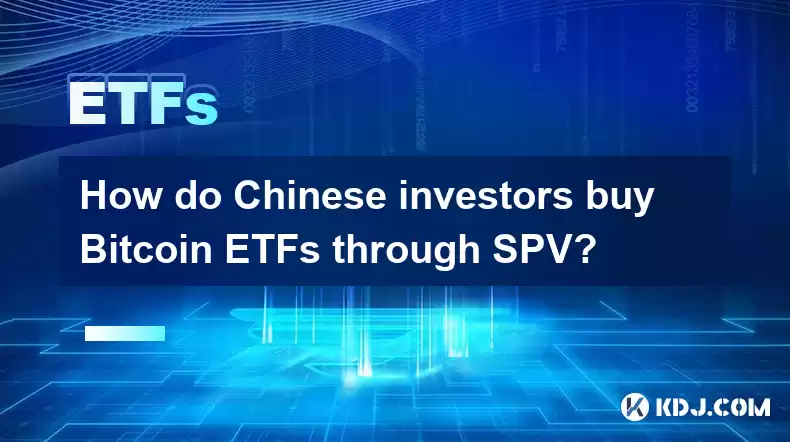
Understanding Bitcoin ETFs and SPVs in the Context of Chinese Investors
Bitcoin Exchange-Traded Funds (ETFs) offer a regulated and convenient way to gain exposure to Bitcoin's price movements without directly holding the cryptocurrency. However, direct access to Bitcoin ETFs is often limited by regulatory restrictions in various jurisdictions, including China. This is where Special Purpose Vehicles (SPVs) can play a role for Chinese investors seeking indirect exposure. An SPV is a legally separate entity established for a specific purpose, often to facilitate investments that would otherwise be difficult or impossible.
How SPVs Facilitate Bitcoin ETF Access for Chinese Investors
For Chinese investors, the use of an SPV might involve a structure where the SPV invests in a Bitcoin ETF listed on a permissible exchange, such as in the US or Europe. The SPV then issues its own shares or units to Chinese investors, providing them with indirect exposure to the underlying Bitcoin ETF. This structure helps circumvent potential regulatory hurdles in China concerning direct investment in cryptocurrencies or foreign securities. This indirect approach allows participation while adhering to local regulations.
The Mechanics of Investing via an SPV
The process typically involves several steps:
- Identifying a reputable SPV: Due diligence is crucial. Investors should carefully research the SPV's track record, management team, and legal structure. Transparency and regulatory compliance are paramount.
- Understanding the investment structure: Investors need to fully grasp how the SPV operates and the fees involved. This includes understanding the expense ratio of the underlying Bitcoin ETF and any additional fees charged by the SPV. Full disclosure of all fees and risks is essential.
- Opening an account with the SPV: This usually involves providing necessary KYC (Know Your Customer) and AML (Anti-Money Laundering) documentation. Compliance with these regulations is mandatory.
- Investing in the SPV: Investors purchase shares or units in the SPV, which in turn holds the Bitcoin ETF. The investment amount will depend on the individual's risk tolerance and financial goals. Diversification is crucial; this should not be your only investment.
- Monitoring performance: Investors should regularly monitor the performance of both the SPV and the underlying Bitcoin ETF.
Risks Associated with Using SPVs
While SPVs offer a potential solution, they also carry inherent risks:
- Counterparty risk: There's a risk that the SPV itself might default or fail to meet its obligations. Thorough due diligence is critical to mitigate this risk.
- Regulatory uncertainty: The regulatory landscape surrounding cryptocurrencies and SPVs can be volatile. Changes in regulations could impact the SPV's operations. Staying informed about regulatory developments is crucial.
- Liquidity risk: It might be difficult to quickly sell shares or units in the SPV, especially if the underlying Bitcoin ETF is illiquid. Understanding the liquidity of the SPV is important.
- Operational risk: There's a risk of operational failures within the SPV, leading to losses for investors. A robust operational framework within the SPV is crucial.
- Management risk: The competence and integrity of the SPV's management team are critical factors. Careful vetting of the management team is necessary.
Legal and Tax Implications
Navigating the legal and tax implications is crucial. Chinese investors should seek professional advice from qualified legal and tax advisors to understand the tax consequences of investing in an SPV that holds a Bitcoin ETF. Tax laws vary significantly across jurisdictions, and non-compliance can lead to severe penalties. Professional advice is strongly recommended.
Due Diligence and Transparency
Before investing in any SPV, conducting thorough due diligence is essential. This includes verifying the SPV's legal structure, its track record, the management team's experience, and the fees charged. Transparency is crucial; the SPV should provide clear and accurate information about its investments and operations. Transparency and accountability are paramount.
Frequently Asked Questions
Q: Are there any legal restrictions on Chinese investors using SPVs to access Bitcoin ETFs?
A: Yes, the regulatory landscape in China concerning cryptocurrencies is constantly evolving. It's crucial to consult with legal professionals to ensure compliance with all relevant Chinese regulations. The legality and accessibility of specific SPV structures can change.
Q: What are the typical fees associated with investing in a Bitcoin ETF through an SPV?
A: Fees will vary depending on the specific SPV and the underlying Bitcoin ETF. These can include management fees, performance fees, and other administrative costs. It's crucial to understand all fees before investing.
Q: How can I find a reputable SPV for investing in Bitcoin ETFs?
A: Thorough research is necessary. Look for SPVs with a proven track record, transparent operations, and a strong management team. Consult with financial advisors who specialize in this area.
Q: What are the risks involved in investing in a Bitcoin ETF through an SPV?
A: Several risks exist, including counterparty risk, regulatory uncertainty, liquidity risk, operational risk, and management risk. Understanding these risks and implementing appropriate risk mitigation strategies is crucial.
Q: Is it possible to directly buy Bitcoin ETFs listed on foreign exchanges from China?
A: Directly buying foreign-listed Bitcoin ETFs from within China is often restricted due to capital controls and regulatory limitations. This is why the SPV structure is considered.
Q: What are the tax implications of investing in a Bitcoin ETF through an SPV for Chinese investors?
A: Tax implications are complex and depend on both Chinese and the jurisdiction where the ETF is listed tax laws. Seeking advice from a qualified tax professional is essential.
Disclaimer:info@kdj.com
The information provided is not trading advice. kdj.com does not assume any responsibility for any investments made based on the information provided in this article. Cryptocurrencies are highly volatile and it is highly recommended that you invest with caution after thorough research!
If you believe that the content used on this website infringes your copyright, please contact us immediately (info@kdj.com) and we will delete it promptly.
- Decentralized Provers Take Center Stage: Mainnet Launches and Network Growth
- 2025-08-06 00:30:12
- ElevenLabs, AI Music, and Artist Licensing: Navigating the New Soundscape
- 2025-08-06 00:30:12
- Crypto Presales to Watch: WeWake Finance & the Rise of User-Friendly Web3
- 2025-08-06 00:35:12
- Uniswap Valuation Under the Microscope: Bitwise CIO's Perspective
- 2025-08-05 23:10:12
- Coinbase's $2 Billion Convertible Notes: A Bold Move or Risky Bet?
- 2025-08-05 23:10:12
- BlockchainFX ($BFX): Your Last Chance at a 100x Crypto Presale?
- 2025-08-05 23:50:12
Related knowledge
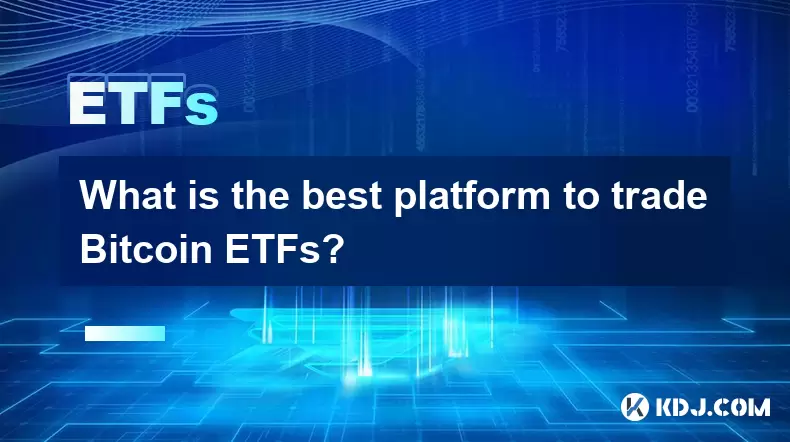
What is the best platform to trade Bitcoin ETFs?
Jul 23,2025 at 04:14am
Understanding Bitcoin ETFs and Their Role in TradingBitcoin Exchange-Traded Funds (ETFs) have gained significant traction among traditional and crypto...
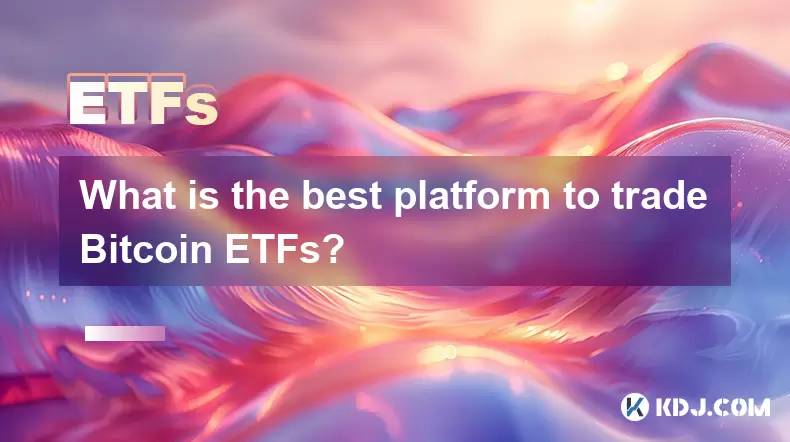
What is the best platform to trade Bitcoin ETFs?
Jul 17,2025 at 03:50pm
Understanding Bitcoin ETFs and Their Role in the MarketBitcoin Exchange-Traded Funds (ETFs) are investment vehicles that track the price of Bitcoin wi...
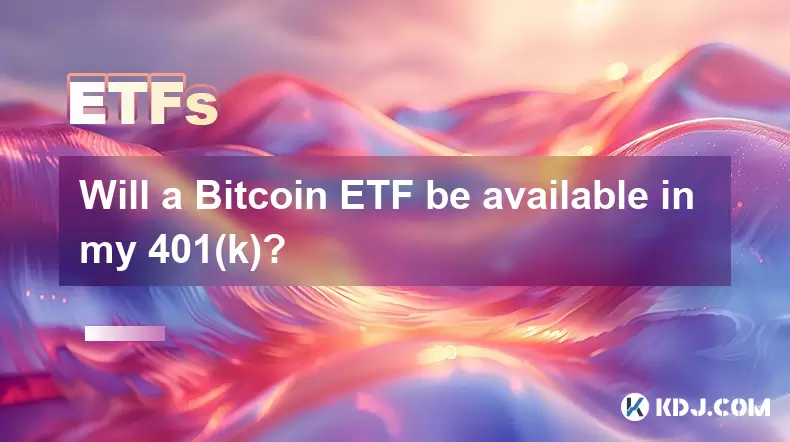
Will a Bitcoin ETF be available in my 401(k)?
Jul 17,2025 at 10:42pm
What is a Bitcoin ETF?A Bitcoin ETF (Exchange-Traded Fund) is an investment vehicle that tracks the price of Bitcoin without requiring investors to di...
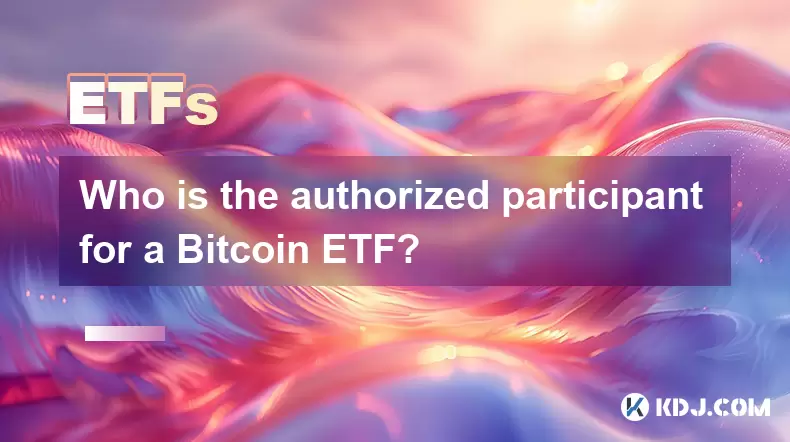
Who is the authorized participant for a Bitcoin ETF?
Jul 18,2025 at 12:42am
Understanding the Role of Authorized Participants in Bitcoin ETFsIn the context of Bitcoin Exchange-Traded Funds (ETFs), an authorized participant (AP...
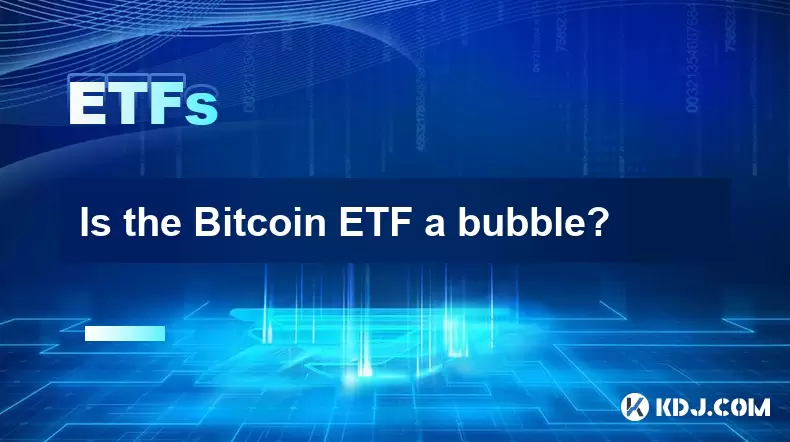
Is the Bitcoin ETF a bubble?
Jul 20,2025 at 06:57am
Understanding the Bitcoin ETF ConceptA Bitcoin Exchange-Traded Fund (ETF) is a financial product that aims to track the price of Bitcoin without requi...
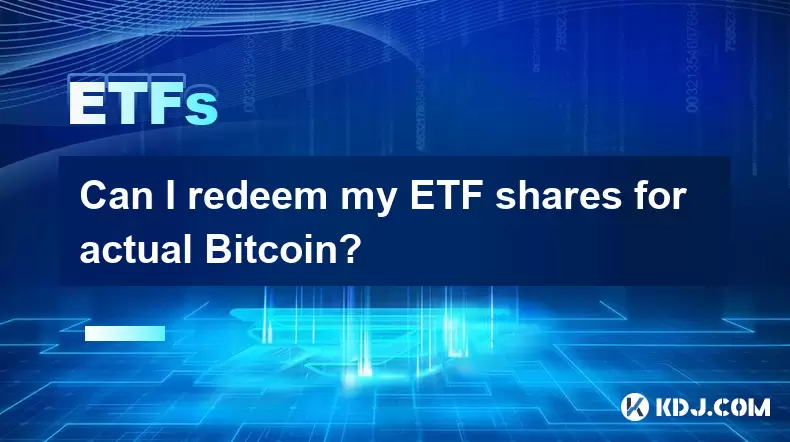
Can I redeem my ETF shares for actual Bitcoin?
Jul 17,2025 at 03:14pm
Understanding ETF Shares and Their Relation to BitcoinExchange-Traded Funds (ETFs) have become a popular investment vehicle for those looking to gain ...

What is the best platform to trade Bitcoin ETFs?
Jul 23,2025 at 04:14am
Understanding Bitcoin ETFs and Their Role in TradingBitcoin Exchange-Traded Funds (ETFs) have gained significant traction among traditional and crypto...

What is the best platform to trade Bitcoin ETFs?
Jul 17,2025 at 03:50pm
Understanding Bitcoin ETFs and Their Role in the MarketBitcoin Exchange-Traded Funds (ETFs) are investment vehicles that track the price of Bitcoin wi...

Will a Bitcoin ETF be available in my 401(k)?
Jul 17,2025 at 10:42pm
What is a Bitcoin ETF?A Bitcoin ETF (Exchange-Traded Fund) is an investment vehicle that tracks the price of Bitcoin without requiring investors to di...

Who is the authorized participant for a Bitcoin ETF?
Jul 18,2025 at 12:42am
Understanding the Role of Authorized Participants in Bitcoin ETFsIn the context of Bitcoin Exchange-Traded Funds (ETFs), an authorized participant (AP...

Is the Bitcoin ETF a bubble?
Jul 20,2025 at 06:57am
Understanding the Bitcoin ETF ConceptA Bitcoin Exchange-Traded Fund (ETF) is a financial product that aims to track the price of Bitcoin without requi...

Can I redeem my ETF shares for actual Bitcoin?
Jul 17,2025 at 03:14pm
Understanding ETF Shares and Their Relation to BitcoinExchange-Traded Funds (ETFs) have become a popular investment vehicle for those looking to gain ...
See all articles

























































































